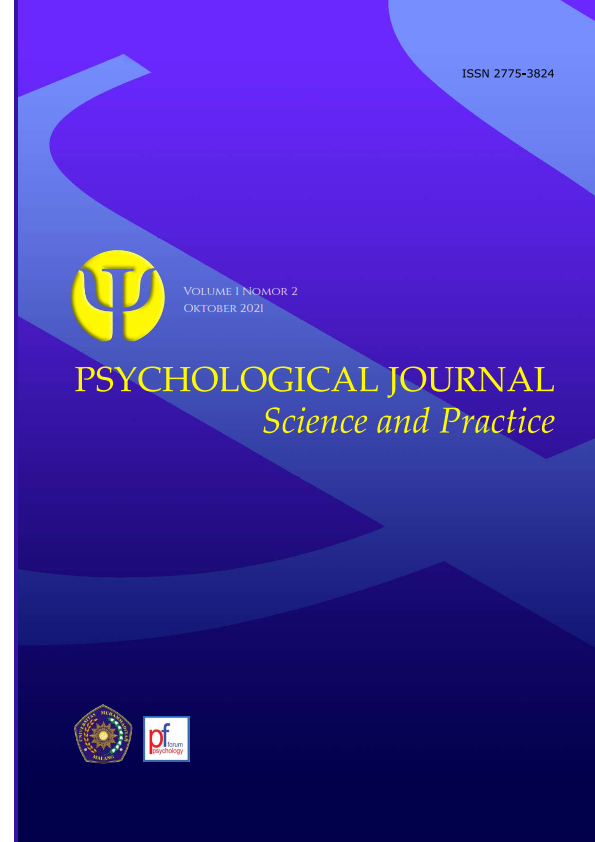Harga diri sebagai mediator pengaruh pola asuh otoritatif terhadap resiliensi remaja
DOI:
https://doi.org/10.22219/pjsp.v1i2.18464Keywords:
authoritative parenting,, resilience, self esteem, adolescentsAbstract
Adolescence is marked by many changes so that adolescents will face difficult and challenging situations. The ability to adapt to difficult situations affects the development and psychological well-being of adolescents. Resilience is an individual’s ability to adapt to adversity and challenges. This study aims to examine the role of self-esteem in mediating the effect of authoritative parenting on resilience. The sampling technique in this study used accidental sampling using a web survey Google Form. Participants were 160 teenagers, aged 12 to 18 years. The instruments used were the Parenting Style Scale Index (PSI), Resilience Scale 14 (RS-14) and the Rosenberg Self-Esteem Scale (RSES). The results showed that self-esteem mediates the effect of authoritative parenting on adolescent resilience.
Downloads
References
Alhajri, R. K., Castor-Guyonvarch, N., & Massioui, F. El. (2020). The impact of parental treatment on resilience in adolescents. Journal of Education and Social Sciences, 15(1), 79–87.
Anwer, G., Masood, S., Younas, S., & Ahmad, M. (2019). Parental rearing practices as predictors of resilience and emotional
intelligence among young adults. Foucation University Journal Of Psychology, 3(2), 1–38.https://doi.org/10.33897/
fujp3.2231082019
Astriani, D., Nurani, P., & Latipun. (2019). The effect of resilience on preceived stress moderated by extraversion personality in adolescent who live in orphanages. 304(Acpch 2018), 251–253.https://doi.org/10.2991/acpch-18.2019.62
Bajaj, B. (2017). Mediating role of self-esteem in the relationship of mindfulness to resilience and stress. International Journal of Emergency Mental Health, 19(4), 1–6.https://doi.org/10.4172/1522-4821.1000372
Baumrind, D. (2005). Patterns of parental authority and adolescent autonomy. New Directions for Child and Adolescent
Development, 108, 61–69.https://doi.org/10.1002/cd.128
Benetti, C., & Kambouropoulos, N. (2006). Affect-regulated indirect effects of trait anxiety and trait resilience on
self-esteem. Personality and Individual Differences, 41(2), 341–352.https://doi.org/10.1016/j.paid.2006.01.015
Beutel, M. E., Tibubos, A. N., Klein, E. M., Schmutzer, G., Reiner, I., Kocalevent, R. D., & Br´ahler, E. (2017). Childhood
adversities and distress - The role of resilience in a representative sample. PLoS ONE, 12(3), 9–11.https://doi.
org/10.1371/journal.pone.0173826
Bonanno, G. A., & Diminich, E. D. (2013). Annual research review: Positive adjustment to adversity - Trajectories of
minimal-impact resilience and emergent resilience. Journal of Child Psychology and Psychiatry and Allied Disciplines,
(4), 378–401.https://doi.org/10.1111/jcpp.12021
Bowes, L., Maughan, B., Caspi, A., Moffitt, T. E., & Arseneault, L. (2010). Families promote emotional and behavioural
resilience to bullying: Evidence of an environmental effect. Journal of Child Psychology and Psychiatry and Allied Disciplines, 51(7), 809–817.https://doi.org/10.1111/j.14697610.2010.02216.x
Connor, K. M., & Davidson, J. R. T. (2003). Development of a new resilience scale: The Connor-Davidson resilience scale
(CD-RISC). Depression and Anxiety, 18(2), 76–82.https://doi.org/10.1002/da.10113
Corcoran, M., & McNulty, M. (2018). Examining the role of attachment in the relationship between childhood adversity,
psychological distress and subjective well-being. Child Abuse and Neglect, 76, 297–309.https://doi.org/10.1016/j.chiabu.
11.012
Desmita, D. (2009). Mengembangkan resiliensi remaja dalam upaya mengatasi stres sekolah. Ta’dib, 11(2).https://doi.org/
31958/jt.v12i1.150
Dias, P. C., & Cadime, I. (2017). Protective factors and resilience in adolescents: The mediating role of self-regulation. Psicologia Educativa, 23(1), 37–43.https://doi.org/10.1016/j.pse.2016.09.003
Evidence Base from GEAS-Indonesia: Baseline 2019. (2020). Early Adolescent’s Health in Indonesia. UGM Center for
Reproductive Health.https://www.geastudy.org/all-reports/indonesia-baseline-report
Fletcher, D., & Sarkar, M. (2013). Psychological resilience: A review and critique of definitions, concepts, and theory.
European Psychologist, 18(1), 12–23.https://doi.org/10.1027/1016-9040/a000124
Gray, M. R., & Steinberg, L. (1999). Unpacking authoritative parenting: reassessing a multidimensional construct. Journal
of Marriage and the Family, 61(3), 574.https://doi.org/10.2307/353561
Hayes, A. F., & Preacher, K. J. (2014). Statistical mediation analysis with a multicategorical independent variable. British
Journal of Mathematical and Statistical Psychology, 67(3), 451–470.https://doi.org/10.1111/bmsp.12028
Hesari, N. K. Z., & Hejazi, E. (2011). The mediating role of self-esteem in the relationship between the authoritative parenting style and aggression. Procedia - Social and Behavioral Sciences, 30, 1724–1730.https://doi.org/10.1016/j.sbspro.
10.333
Jackson, C., Henriksen, L., & Foshee, V. A. (1998). The authoritative parenting index: Predicting health risk behaviors
among children and adolescents. Health Education and Behavior, 25(3), 319–337.https://doi.org/10.1177/
Jackson, L. M., Pratt, M. W., Hunsberger, B., & Pancer, S. M. (2005). Optimism as a mediator of the relation between
perceived parental authoritativeness and adjustment among adolescents: Finding the sunny side of the street. Social
Development, 14(2), 273–304.https://doi.org/10.1111/j.14679507.2005.00302.x
Kapıkıran, S¸ ., & Acun-Kapıkıran, N. (2016). Optimism and psychological resilience in relation to depressive symptoms
in university students: Examining the mediating role of self-esteem. Kuram ve Uygulamada Egitim Bilimleri, 16(6),
–2110.https://doi.org/10.12738/estp.2016.6.0107
Karatas, Z., & Cakar, F. S. (2011). Self-Esteem and Hopelessness, and resiliency: An exploratory study of adolescents in Turkey. International Education Studies, 4(4).https://doi.org/10.5539/ies.v4n4p84
Kritzas, N., & Grobler, A. A. (2005). The relationship between perceived parenting styles and resilience during
adolescence.Journal of Child and Adolescent Mental Health, 17(1), 1–12.https://doi.org/10.2989/17280580509486586
Kwek, A., Bui, H. T., Rynne, J., & So, K. K. F. (2013). The impacts of self-esteem and resilience on academic performance: An
investigation of domestic and international hospitality and tourism undergraduate students. Journal of Hospitality and
Tourism Education, 25(3), 110–122.https://doi.org/10.1080/10963758.2013.826946
Lee, J. H., Nam, S. K., Kim, A. R., Kim, B., Lee, M. Y., & Lee, S. M. (2013). Resilience: A meta-analytic approach.
Journal of Counseling and Development, 91(3), 269–279. https://doi.org/10.1002/j.1556-6676.2013.00095.x
Liu, Y., Wang, Z., Zhou, C., & Li, T. (2014). Affect and self-esteem as mediators between trait resilience and psychological
adjustment. Personality and Individual Differences, 66, 92–97. https://doi.org/10.1016/j.paid.2014.03.023
Malhi, G. S., Das, P., Bell, E., Mattingly, G., & Mannie, Z. (2019). Modelling resilience in adolescence and adversity: a novel
framework to inform research and practice. Translational Psychiatry, 9(1).https://doi.org/10.1038/s41398-019-0651-y
Mathibe, Goitseona E. (2015). The relationship between perceived parenting styles, resilience and emotional intelligence among adolescents. [Tesis, North-West University].http://repository. nwu.ac.za/handle/10394/17416
Mittal, S., Singh, P., & Kumar, S. (2018). Self-esteem , depression and resilience amongst university students: A comparative
study. Indian Journal of Human Relations, 52(2), 108–114.
Robins, R. W., & Trzesniewski, K. H. (2005). Self-esteem development across the lifespan. Current Directions in
Psychological Science, 14(3), 158–162.https://doi.org/10.1111/j.0963-7214.2005.00353.x
Sameshima, H., Shimura, A., Ono, K., Masuya, J., Ichiki, M., Nakajima, S., Odagiri, Y., Inoue, S., & Inoue, T. (2020).
Combined effects of parenting in childhood and resilience on work stress in nonclinical adult workers from the community. Frontiers in Psychiatry, 11, 1–9.https://doi.org/10.3389/fpsyt.2020.00776
Sameshima, H., Shimura, A., Ono, K., Masuya, J., Ichiki, M., Nakajima, S., Odagiri, Y., Inoue, S., & Inoue, T. (2020).
Combined effects of parenting in childhood and resilience on work stress in nonclinical adult workers from the
community. Front. Psychiatry, 11.https://doi.org/10.3389/fpsyt.2020.00776
Snyder, C. R., & Lopez, S. J. (2016). The oxford handbook of positive psychology (3rd edition). Oxford University Press.
https://doi.org/10.1093/oxfordhb/9780199396511.001.0001
Steinberg, L., Lamborn, S. D., Dornbusch, S. M., & Darling, N. (1992). Impact of parenting practices on adolescent
achievement: Authoritative parenting, school involvement, and encouragement to succeed. Child Development, 63(5), 1266–1281.https://doi.org/10.1111/j.1467-8624.1992.tb01694.x
Veselska, Z., Geckova, A. M., Orosova, O., Gajdosova, B., van Dijk, J. P., & Reijneveld, S. A. (2009). Self-esteem and resilience:
The connection with risky behavior among adolescents.
Addictive Behaviors, 34(3), 287–291.https://doi.org/10.1016/j.addbeh.2008.11.005
Wadman, R., Hiller, R. M., & St Clair, M. C. (2019). The influence of early familial adversity on adolescent risk behaviors and
mental health: Stability and transition in family adversity profiles in a cohort sample. Development and Psychopathology,
–18.https://doi.org/10.1017/S0954579419000191
Wagnild, G. M., & Young, H. M. (1993). Development and psychometric evaluation of the Resilience Scale. J. Nurs.
Meas, 1, 165–178
Wagnild, G. (2009). The Resilience Scale User’s Guide for the US Englishversion of the Resilience Scale and the 14-Item
Resilience Scale (RS-14). Worden, MT: Resilience Center.
Wolitzky-Taylor, K., Sewart, A., Vrshek-Schallhorn, S., Zinbarg, R., Mineka, S., Hammen, C., Bobova, L., Adam, E. K., &
Craske, M. G. (2017). The effects of childhood and adolescent adversity on substance use disorders and poor health in early adulthood. Journal of Youth and Adolescence, 46(1), 15–27. https://doi.org/10.1007/s10964-016-0566-3
Yaghoubi, H., Vaghef, L., & Nellaee, P. (2019). The Role of self-esteem and emotional intelligence in predicting the resilience of students with hearing impairment. Journal of Child Mental Health, 6(3), 162-172.
Zolkoski, S. M., & Bullock, L. M. (2012). Resilience in children and youth: A review. Children and Youth Services Review,
(12), 2295–2303.https://doi.org/10.1016/j.childyouth.2012.08.009

Downloads
Published
How to Cite
Issue
Section
License
Copyright (c) 2022 Siti Rezeki Emelia, Diah Karmiyati, Cahyaning Suryaningrum

This work is licensed under a Creative Commons Attribution-ShareAlike 4.0 International License.
Authors who publish with Psychological Journal: Science and Practice (PJSP) agree to the following terms:
- For all articles published in Psychological Journal: Science and Practice (PJSP), copyright is retained by the authors. Authors give permission to the publisher to announce the work with conditions. When the manuscript is accepted for publication, the authors agree to automatic transfer of the publishing right to the publisher.
- Authors retain copyright and grant the journal right of first publication with the work simultaneously licensed under a Creative Commons Attribution-ShareAlike 4.0 International License that allows others to share the work with an acknowledgment of the work's authorship and initial publication in this journal.
- Authors are able to enter into separate, additional contractual arrangements for the non-exclusive distribution of the journal's published version of the work (e.g., post it to an institutional repository or publish it in a book), with an acknowledgment of its initial publication in this journal.
- Authors are permitted and encouraged to post their work online (e.g., in institutional repositories or on their website) prior to and during the submission process, as it can lead to productive exchanges, as well as earlier and greater citation of published wor (See The Effect of Open Access).
This work is licensed under a Creative Commons Attribution-ShareAlike 4.0 International License.







